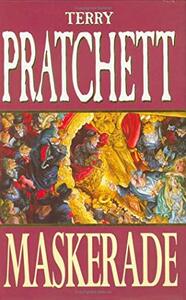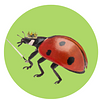Take a photo of a barcode or cover
It's a really great story with some funny bits, some really well-made philosophical bits (especially the speech about masks at the very end), and some very thrilling bits at the end as well. And the newest audiobook is incredibly impressively made, with audio splitting and fading to represent Perdita's vocal talent, which left me in awe. But there was just something missing for me, I just didn't think it was funny enough or I wasn't too engaged with the characters. Maybe they seem a little one-dimensional to me. Moving onto a different series for now.
adventurous
funny
lighthearted
fast-paced
Plot or Character Driven:
Plot
Strong character development:
Yes
Loveable characters:
Yes
Diverse cast of characters:
Yes
Flaws of characters a main focus:
No
adventurous
funny
medium-paced
Plot or Character Driven:
A mix
Strong character development:
Yes
Loveable characters:
Yes
Diverse cast of characters:
Yes
Flaws of characters a main focus:
Yes
Once again there's the usual Pratchett combination of wit, slapstick, philosophy, political comment, wry commentary on human nature and sci-fi/fantasy - this time set at the Opera. And while I was reading I decided to remember some classic sentences (or two), so I took note:
He had a unique stride: it looked as though his body were being dragged forward and his legs had to flail around underneath it, landing wherever they could find room. It wasn't so much a walk as a collapse, indefinitely postponed.Of course, Nanny Ogg could drink anything, but clever Pratchett calling a strong alcohol 'brain-death':
Just to keep bad dreams at bay, she took a swig out of a bottle that smelled of apples and happy brain-death.Who but Pratchett would think of using the word ballistic to describe someone's singing?:
... Nanny Ogg, whose attitude to songs was purely ballistic. You just pointed your voice at the end of the verse and went for it.Haven't we all done this?!:
'... Time creeps up behind you, all the . . .' He fumbled for a word, and settled lamely for 'Time. ...'I have no idea if Pratchett ever enjoyed going to the opera, but he enjoys poking fun at it (as he does at so many things) - and what a very clever phrase at the end of this sentence:
The chorus was filing on to be A Busy Marketplace, in which various jugglers, gypsies, sword-swallowers and gaily dressed yokels would be entirely unsurprised at an apparently drunken baritone strolling on to sing an enormous amount of plot at a passing tenor.Here he coins a new word and describes it perfectly:
There was a crash from the direction of the kitchen, although it was really more of a crashendo - the long-drawn-out clatter that begins when a pile of plates begins to slip, continues when someone tries to grab at them, develops a desperate counter-theme when the person realizes they don't have three hands, and ends with the roinroinroin of the one miraculously intact plate spinning round and round on the floor.Finally, one about the mentality of a mob:
And since the IQ of a mob of the IQ of its most stupid member divided by the number of mobsters, it was never very clear to anyone what had happened.
A series of reviews part 20.
The witches are in Ankh Morpork to locate their friend Agnes Nitt from Lancre who has run away to become an opera singer. Pratchett uses a Phantom of the Opera parody to explore opera (naturally), music, the theater, and backstage culture. He gets a few digs in at the publishing industry and makes a lot of cracks about creative businesses that also need to get creative with their accounting (still relevant in the movie industry if you ask me). While this one didn't have a ton of big laughs for me, it's very smart. There's a screwball comedy's pace to Nanny Ogg and Esme Weatherwax in the big city, but it's foremost a book about opera. With previous Discworld books: rock n' roll sure, the golden age of Hollywood, ok. But opera? I love it anyway. Nanny Ogg and Esme are my girls and anything they want to do is fine. There's no Magrat at all, as Agnes Nitt is the new third here. She's a pretty good character, her perfect voice is a cool power, but it's not the same and the witches tend to repeat a lot of the old jokes. It's good though, really really good, but compared to Wyrd Sisters, it's not going to be AS good.
Agnes finds herself as a comically large ingenue at an opera house amid a financial crisis and change of ownership. She has some of those latent witch powers from Lancre and a magical vocal range that can do anything. But the new owner's pretty, thin, blonde daughter is cast instead. Agnes finds herself "filling in" for the other singer's deficiencies without the credit. There's a phantom too, and the story goes in a delightful melodrama direction. There are presumably many references to famous operas. I really don't know however, I'm not even a Shakespeare expert! I've heard OF famous operas, but it's the behind-the-scenes theater stuff that works the most for me.
The early plot concerning the cookbook was funny but it runs out of steam by the climax when they join the main plot. Nanny sends in a cookbook to be published, only its special sexy recipes for lewd sex magic lovers called The Joy of Snacks. Of course, it's an instant best-seller. When Nanny receives a handful of dollars and a thank you note in response, Esme takes her to learn the virtue of a creator asserting their rights to royalties. The subplot starts strong but the mysterious recipe names and lewd puns got a little repetitive. Another sophisticated bawdy entry in general like Lords and Ladies of which this is about equal.
But, something was missing for me. Maybe it's the fat jokes. Agnes is described as a very large woman, and it's true enough for opera I suppose, so Pratchett is using the subject and the more feminist witch series themes to explore weight. And I'm reminded of way back in Guards! Guards! when Lady Ramkin had to be the subject of dozens of fat jokes just to credibly imply that Vimes wouldn't be instantly attracted to her. But this book is a little more nuanced, it's six years and ten books later (!). But I think it had a hard time finding a balance with some of the jokes. Overall, Pratchett gets into the assumptions society makes about weight in a way that, in my opinion, was very PC for the time but seems sort of clunky now.
It's a good theater book! A nice theater comedy. There are quite a lot of jokes about Andrew Lloyd Webber. For me personally, I knew I had this book but had zero memory of reading it, but then in doing so remembered various bits. It's hard to forget the banana surprise joke. So I was 14-15, and remember the book's messages about how weight is perceived as something I found thoughtful.
The witches are in Ankh Morpork to locate their friend Agnes Nitt from Lancre who has run away to become an opera singer. Pratchett uses a Phantom of the Opera parody to explore opera (naturally), music, the theater, and backstage culture. He gets a few digs in at the publishing industry and makes a lot of cracks about creative businesses that also need to get creative with their accounting (still relevant in the movie industry if you ask me). While this one didn't have a ton of big laughs for me, it's very smart. There's a screwball comedy's pace to Nanny Ogg and Esme Weatherwax in the big city, but it's foremost a book about opera. With previous Discworld books: rock n' roll sure, the golden age of Hollywood, ok. But opera? I love it anyway. Nanny Ogg and Esme are my girls and anything they want to do is fine. There's no Magrat at all, as Agnes Nitt is the new third here. She's a pretty good character, her perfect voice is a cool power, but it's not the same and the witches tend to repeat a lot of the old jokes. It's good though, really really good, but compared to Wyrd Sisters, it's not going to be AS good.
Agnes finds herself as a comically large ingenue at an opera house amid a financial crisis and change of ownership. She has some of those latent witch powers from Lancre and a magical vocal range that can do anything. But the new owner's pretty, thin, blonde daughter is cast instead. Agnes finds herself "filling in" for the other singer's deficiencies without the credit. There's a phantom too, and the story goes in a delightful melodrama direction. There are presumably many references to famous operas. I really don't know however, I'm not even a Shakespeare expert! I've heard OF famous operas, but it's the behind-the-scenes theater stuff that works the most for me.
The early plot concerning the cookbook was funny but it runs out of steam by the climax when they join the main plot. Nanny sends in a cookbook to be published, only its special sexy recipes for lewd sex magic lovers called The Joy of Snacks. Of course, it's an instant best-seller. When Nanny receives a handful of dollars and a thank you note in response, Esme takes her to learn the virtue of a creator asserting their rights to royalties. The subplot starts strong but the mysterious recipe names and lewd puns got a little repetitive. Another sophisticated bawdy entry in general like Lords and Ladies of which this is about equal.
But, something was missing for me. Maybe it's the fat jokes. Agnes is described as a very large woman, and it's true enough for opera I suppose, so Pratchett is using the subject and the more feminist witch series themes to explore weight. And I'm reminded of way back in Guards! Guards! when Lady Ramkin had to be the subject of dozens of fat jokes just to credibly imply that Vimes wouldn't be instantly attracted to her. But this book is a little more nuanced, it's six years and ten books later (!). But I think it had a hard time finding a balance with some of the jokes. Overall, Pratchett gets into the assumptions society makes about weight in a way that, in my opinion, was very PC for the time but seems sort of clunky now.
It's a good theater book! A nice theater comedy. There are quite a lot of jokes about Andrew Lloyd Webber. For me personally, I knew I had this book but had zero memory of reading it, but then in doing so remembered various bits. It's hard to forget the banana surprise joke. So I was 14-15, and remember the book's messages about how weight is perceived as something I found thoughtful.
I've been very annoyed lately with the amount of time I haven't had to read Pratchett. All day I've been tied up in various life tasks and have not had nearly enough time to fall into Discworld. This problem does make me think that there might not be enough time for Discworld. How much time would be enough? And at what point have I crossed the line from fan to Fan?
At any rate, Maskerade is a gem. The witches are abroad again and no one is safe. Or at least, no one will be left undisturbed.
First reading 2010; second reading 2020
At any rate, Maskerade is a gem. The witches are abroad again and no one is safe. Or at least, no one will be left undisturbed.
First reading 2010; second reading 2020
Very much enjoyed this first time around. Now rereading nearly 30 years later, I get so many more of the references. This isn't just a parody of Phantom of the Opera, but so much more. It may not have the scale or magnificence of other Discworld books, but still a great read.
July 2016: Re-read #3 or #4 (I don't remember which, but it's been a lot). Interesting to re-read after probably 10 years.
Very solid and better than I remember it being. And while it does a great job of continuing the character arcs for the Lancre witches while satirizing Opera/musical theatre - it doesn't do as complete of a job as it does with "Moving Pictures" or "Soul Music." Still very compelling reading all the way to the end.
Original rating: 3 stars. Leaving it at 3 stars 'cause it wasn't as good as "Moving Pictures" or "Soul Music"
Very solid and better than I remember it being. And while it does a great job of continuing the character arcs for the Lancre witches while satirizing Opera/musical theatre - it doesn't do as complete of a job as it does with "Moving Pictures" or "Soul Music." Still very compelling reading all the way to the end.
Original rating: 3 stars. Leaving it at 3 stars 'cause it wasn't as good as "Moving Pictures" or "Soul Music"
I’m on a quest to (re)read the entire Discworld series in order. I’ve read about 2/3 of them over the last couple decades, but scattered and out of order.
Title: Maskerade
Publication year: 1995
Discworld # 18, Witches # 5
Protagonist(s): Esme “Granny” Weatherwax, Gytha “Nanny” Ogg, Agnes Nitt (AKA Perdita X. Dream)
Other characters: Walter Pinge, janitor at the Opera House; Mr. Bucket, owner of the Opera House; Mr. Salzella, music director; famous tenor Enrico Basilica; Greebo the cat
Antagonist(s): the mysterious masked man in the Opera House
Locale: Lancre, Ankh-Morpork
Main plotline: Agnes doesn’t want to be a witch so runs away to Ankh-Morpork to sing in the opera; the witches follow and they all become involved in a murder mystery in the Opera House
Themes: jealousy, greed, bullying, discrimination
Rating: 4.5 stars
Title: Maskerade
Publication year: 1995
Discworld # 18, Witches # 5
Protagonist(s): Esme “Granny” Weatherwax, Gytha “Nanny” Ogg, Agnes Nitt (AKA Perdita X. Dream)
Other characters: Walter Pinge, janitor at the Opera House; Mr. Bucket, owner of the Opera House; Mr. Salzella, music director; famous tenor Enrico Basilica; Greebo the cat
Antagonist(s): the mysterious masked man in the Opera House
Locale: Lancre, Ankh-Morpork
Main plotline: Agnes doesn’t want to be a witch so runs away to Ankh-Morpork to sing in the opera; the witches follow and they all become involved in a murder mystery in the Opera House
Themes: jealousy, greed, bullying, discrimination
Rating: 4.5 stars





